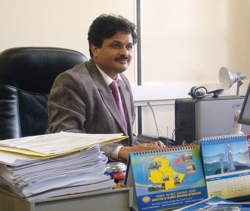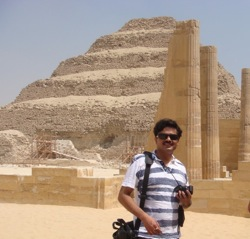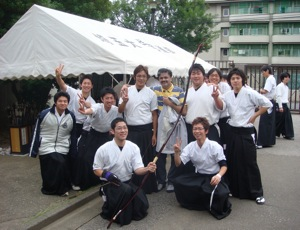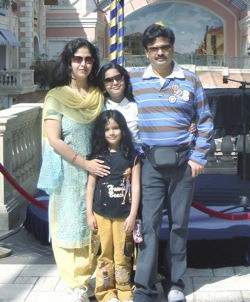 Abhai Kumar Srivastav, India
Abhai Kumar Srivastav, India
Additional Commissioner, Gujarat Customs Zone, India
Public Finance Program (’01)
Abhai Kumar Srivastav was appointed as Additional Commissioner, Gujarat Customs Zone in April 2007. He is responsible for overall administration of ten customs assessment formations in Gujarat state spanning over 18 districts, including an International Airport and Air Cargo Complex. His main challenges are (i) collection of intelligence and execution thereof to unearth commercial frauds, and (ii) coastal & border security. He was deputed by the Indian Government to Republic Democratic Federal of Ethiopia in June-July 2009 for providing technical assistance to Ethiopian Revenue and Customs Authority (ERCA).
On 16th November, 2004, he was appointed as Deputy Secretary, by the Minister in the Finance Ministry, New Delhi; wherein he was responsible for formulation and implementation of Indirect Tax Policy and Budget. He also looked after the task of Coordinator for the Asian Development Bank’s (ADB) Technical Assistance Project 4263 – Capacity Building for Tax Administration- from June 2005 to July 2007.
Prior to that, he worked for two years as Joint Director in Customs Valuation Directorate, Mumbai, wherein he conceptualized and administered various IT projects that helped in increasing transparency and efficiency of Indian Customs. He has represented India at various seminars and workshops organized by international organizations.
He graduated from premier engineering institution, namely Indian Institute of Technology (IIT), Kanpur in 1989. In 1988, while in third year at IIT, he was invited by NASA to attend a workshop in Cleveland, USA on Space Technology. He was selected in Indian Civil Service out of half a million aspirants and was allocated Indian Revenue Service (IRS) in 1992. One-year extensive foundation in Administration, Law, Taxation, Fiscal policy and Cost Accountancy was imparted at National Academy of Customs, Excise and Narcotics (NACEN), Delhi. He was nominated by World Customs Organization (WCO) to attend the Public Finance Program at GRIPS in 2000. At GRIPS, he was unanimously elected as the Finance Officer of the International Students’ Association.
What is your area of specialization and how did you come to work in this area?
My area of specialization is Customs Law and Indirect Tax Policy. After qualifying Indian Civil Service Examinations, I was allotted Indian Revenue Service (Indirect Taxation) by the Government. I have been looking after Customs, Service Tax and Excise Tax departments in the Ministry of Finance since 1992.

You are currently Additional Commissioner of Gujarat Customs. What are your main responsibilities and what are some of the biggest challenges you face in your work?
The land of Mahatma Gandhi, Gujarat state spearheads the Indian march for the “Global Economic Super Power”. Gujarat has a coastline of 1,600 km, nearly one-third of India’s total coastline length. It also has a big strategic advantage: it is the nearest maritime outlet from India to West Asia, Africa and Europe. My main responsibilities include,
- Prevention of / Investigation into commercial fraud and smuggling cases in Gujarat;
- Implementation of national tariff classification & non-tariff restrictions in international trade;
- Implementation of various bilateral/regional/ multilateral preferential trade agreements;
- Ensuring compliance of indirect tax laws and collection of indirect taxes; and
- Coastal & Border Security.
The biggest challenge I face in the current assignment is keeping a tab on Customs commercial frauds. Customs commercial fraud perpetrators take advantage of every opportunity presented in the multi-modal transportation system and trade pattern to execute a variety of schemes. Further, it is suspected that one aspect of Customs commercial fraud, i.e. overvaluation, has been linked to money laundering. Such masquerading illegal capital outflows could provide criminal groups with funds for criminal acts such as arms purchases/sales, drug smuggling, etc. It remains a long-standing challenge, especially because of its varied modalities and sophisticated nature.
During your career in the Indian Civil Service, what achievement(s) are you most proud of and what have been the most satisfying tasks you accomplished in your career thus far?
Major achievements include:
- I was awarded “Pradesh Ratna” (Jewel of the State) by Hon’ble Governor of Uttar Pradesh State in 1994, for excellence in public service.
- “Samman Patra” (Template of Honour) was presented by the Union Finance Secretary in 1998-99, in recognition of meritorious services rendered.
- I was deputed by the Indian Government to Ethiopia in June-July 2009 as Customs Expert for providing technical assistance to Ethiopian Revenue and Customs Authority (ERCA), in the areas of Risk Management and Customs Valuation.
The following are some of the most satisfying tasks of the career:
- Drafted relevant portions of Finance Bill and other Taxation Bills, and assisted the Finance Minister in the passage of said Bills in both the Houses of the Parliament;
- Administered successfully the “National Imports Database Project”, a totally indigenously planned and executed project. National Imports Database is an electronic, real-time database in respect of all goods imported at 150 odd customs stations in India;
- Conceived and developed “Valuation Corridor” in the Risk Management Module for Automated Customs Clearance System of Import Cargo, as well as National Export Commodity Database;
- Worked as Coordinator for ADB Technical Assistance Project on Capacity Building in Tax Administration, in the Ministry of Finance.
- Single-handedly detected two major commercials frauds involving tax evasion of US Dollar 85 million.

What was the most important thing you learned while at GRIPS? And how has your time in Japan influenced you in your subsequent career?
My educational stint at GRIPS helped me to realize the value of a multi-disciplinary approach and understand the linkages between policy issues, administration and implementation strategies. The Public Finance course in Tokyo gave me excellent exposure to basic tenets of international trade intricacies, public finance, tax policy, business trading system and project management techniques that helped me immensely in performing some very challenging and important tasks.
On my return from GRIPS, I was assigned the charge of Deputy Secretary in Ministry of Finance in the area of Indirect Tax Policy, a very important and challenging assignment. I worked there for three years. Thereafter, I was posted to my current assignment in Gujarat.
Did the, perhaps more lucrative, private sector ever hold any appeal for you?
No. I graduated from supposedly the best engineering college in South Asia, namely Indian Institute of Technology (IIT), Kanpur in 1989. I had the option to go for private sector then itself and there were really tempting offers also available, through campus placement. However, I was never inclined towards private sector. The canvas in public service is much bigger and the assignments are more meaningful and challenging. I am, however, looking forward to working in an international organization.
If you could choose another profession to be in, what would it be?
Teaching profession. Actually, my dream is to teach Customs Law and/or Advanced Microeconomics in a university like GRIPS /UNU. I have delivered a number of lectures at various conferences organized by ADB, WCO etc.
What is your fondest memory of your time spent in Japan?
A family trip to Kyoto city. Kyoto was surreal. Everything from wine and silk to its exceptional natural beauty, Kyoto’s inexhaustible charm must be witnessed at least once in a lifetime. Kyoto at night feels straight out of Miyazaki’s “Spirited Away” where you could swear there are gods coming out to frolic.

What do you miss about Japan?
I miss everything…. I miss my batch mates, my work station in GRIPS, my apartment in Saitama, the tender care of Student Office, the modesty imbibed in Japanese culture….and of course Sakura.
You meet people who forget you. You forget people you meet. But sometimes you meet those people you can`t forget. Those are your ‘friends’…. I never made friends after I was twelve years old…I only made acquaintances. But it changed after coming to GRIPS. I made some real friends after so many years. We never know how special someone is until he/she leaves, but maybe sometimes it’s important to leave, so that we get a chance to see how special that someone really is! I miss some of my friends badly.
My recollections would be incomplete if I did not mention about the vital contribution of our Sensei, who were responsible for our mental and spiritual development. I wish to quote a few lines from an Indian epic “The Mahabharata”, wherein the importance of a preceptor, i.e. a teacher has been portrayed.
“The father and the mother only create the body. The spiritual life, on the other hand, that one obtains from one’s teacher is heavenly. That life is subject to no decay and is immortal. He, who favors a person by imparting to him true instruction, by communicating the intricacies of life, and by giving knowledge that is immortal, should be regarded as superior to both a father and a mother.”
As a student, I shall remain indebted forever to our Sensei for sharpening our abilities and for widening our horizons. I miss the unconditional affection showered on us by the Sensei.
What is your favourite thing to do when you are not working?
Work Hard and Play Hard…that’s the motto. I believe in intense leisure activities. I enjoy playing games with my family like Carom, Board Games and Badminton etc. We go together for swimming, clubbing, and various reality shows/events/theatre. I love to listen to light instrumental music.

How do you maintain a balance between your work and the rest of your life?
One cardinal rule I have made for my life is that I normally try to allocate my time in the ratio of 55%:35%:10% for my career, family and myself respectively. Yes, I do allocate some time only for myself, e.g. going to gym for workout or reading a book. Mostly I succeed in striking this balance, but not always. There are, at times, assignments, when one has to compromise on the rules of life. What is important is to be conscious of the need to strike a balance.
In this regard, there is an excellent book by Robert K Johnston namely “Life is not Work…. Work is not Life”, which beautifully teaches the importance of balance in life.
Besides, I highly recommend everybody to read Part Seven of a bestseller by Dale Carnegie titled “How to Stop Worrying and Start Living”. This section teaches as to how to cut inefficiencies at work, which automatically results in more time for family and self.
What advice would you give to current GRIPS students?
The most important thing in this World is not so much where you stand; it’s rather in which direction you are moving. At no juncture of our lives, we should be content with what we have already achieved; instead we ought to keep planning for new advances. We should never give way to complacency. The future reputation of GRIPS would be partly determined by our performance. You know, that’s a great responsibility on our shoulders. I would like to finish on an upbeat note, by quoting Somerset Maugham,-
“It’s a funny thing about life… If you refuse to accept anything but the best, you very often get it.”





